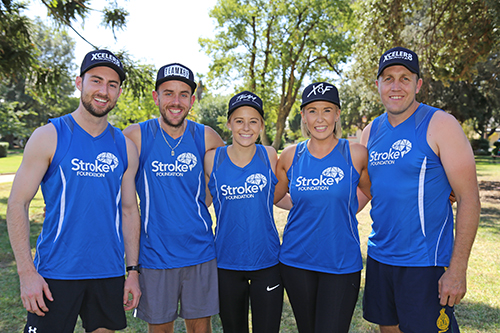A marathon effort to help fight stroke
There was a time when Wagga Wagga real estate agent, stroke survivor and avid runner Helen Woodhouse feared she would not be able to run again.
But the 34 year old is now in training for the 21 kilometre Gold Coast Half Marathon in June, less than a year after stroke turned her world upside down.
Helen said she was on her regular morning run at the time.
“I was in training for my first half marathon and I was the fittest and healthiest I had ever been, but somehow I took a wrong turn and veered off course,’’ Helen said.
“I couldn’t think straight and called my husband Ben.
“I was slurring my words. Ben couldn’t understand what I was saying. He immediately picked me up and convinced me to go to hospital.”
Doctors quickly diagnosed Helen’s stroke and she was given clot busting treatment. This treatment stopped the stroke.
“I realise how lucky I am to have survived the stroke with little physical impact,’’ she said.
“It opened my eyes to be present in the moment. Life is a gift.”
Stroke Foundation New South Wales State Manager Teresa Howarth said around 30 percent of stroke survivors were people of working age, like Helen.
“Helen’s story highlights with the right treatment at the right time many people are able to recovery for stroke,” Ms Howarth said.
“Stroke is a time-critical medical emergency. Each minute up to 1.9 million brain cells die. The faster treatment is sought, the better the chance of recovery.
“This is why Stroke Foundation is aiming for someone in every Australian household to be able to recognise the most common signs of stroke via the F.A.S.T. test.”
The F.A.S.T. test involves four simple actions:
Face – Check their face. Has their mouth drooped?
Arms – Can they lift both arms?
Speech – Is their speech slurred? Do they understand you?
Time – Time is critical. If you see any of these signs, call 000 straight away.
It’s estimated there will be more than 56,000 strokes in Australia in 2018, including more than 400 in the Riverina electorate. Stroke kills more women than breast cancer, more men than prostate cancer and leaves thousands of people with an ongoing disability.
Helen admits her confidence took a huge blow after her stroke and there were many tears.
“It was a traumatic experience and it took me a long time to feel like myself again, she said.
Helen set a goal to take part in the Gold Coast Marathon and she is hoping to raise $5,000 for the Stroke Foundation to help in its mission to prevent treat and beat stroke.

